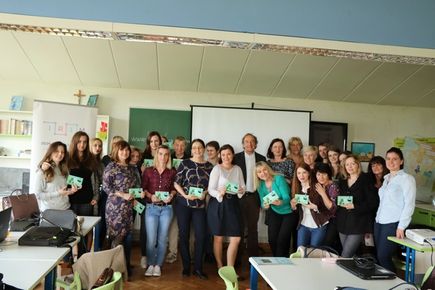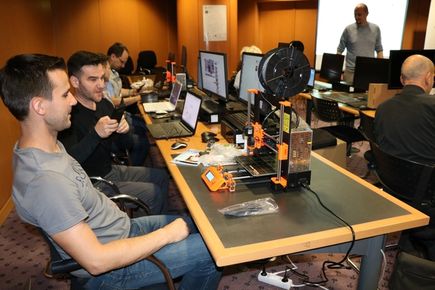IRIM
IRIM (the Institute for Youth Development and Innovation) have been developing and deploying a educational projects based on the micro:bit since 2017.

Their projects have been run in partnership with CARnet, the Croatian Ministry for Education, Rotary District 1913, RotaryClub Zagreb Center and Google.
These projects target different age groups and institutions, from primary school students to seniors, through schools, libraries, educational NGOs, foster homes and community groups.
The implemented projects
STEM revolution
The initial programme brought 23,000 micro:bits to 1100 institutions such as schools, libraries and NGOs, as well as a training programme offering introductory, advanced and subject-specific micro:bit training to teachers.
ProMikro
A national micro:bit roll-out and training programme, in cooperation with the Ministry of Science and Educationand the Croatian Academic and Research Network. Through this project, 85% of the schools (over 800 schools) in Croatia joined the project voluntarily, and a micro:bit was given to every 12-year-old student to use at school and at home.
A new training programme, dedicated to integrating the micro:bit into classroom teaching and subject-specific learning, was rolled out to the 800 schools, reaching 2500 teachers.
STEM revolution in grades 1 to 4 (7 to 11 years)
With this project Croatia becomes possibly the first country in the world to integrate the usage of the micro:bit in first 6 years of the primary school curriculum. 60 schools were provided with 2000 micro:bits, and 150 teachers were trained through a pilot project aiming to introduce programming and digital creativity in the subjects already in the school curriculum.
STEM revolution in libraries
Following the success of the classroom roll-out, a library programme was launched as a crowdfunding campaign with the goal of donating micro:bits and 3D printers in order to transform local libraries into digital education and innovation centres. It resulted in 3,000 micro:bits being made available to borrow in 100 libraries nationally, with training for librarians to enable them to run micro:bit workshops.
The Digital Citizen project
IRIM's latest initiative is supported by $250,000 USD of Google funding and aims to establish libraries as centres of digital creativity. The project seeks to make micro:bits available to borrow from 170 libraries in Croatia, Bosnia & Herzegovina, Kosovo and Serbia, along with training workshops and 3D printers available for use.

By May 2019, 200 workshops had been organised by librarians in Croatia with over 1,500 people in attendance and micro:bit hardware borrowed more than 1,000 times.
Lessons and pedagogy
Materials for teachers participating in IRIM's programmes are made available through a digital portal called Izradi! (Make! in English) Teacher training in the "ProMikro Project" was provided in three stages:
- Basic introductory training for all teachers using the micro:bit for the first time, who were introduced to the basics of programming and the possibilities of the Izradi platform and various coding editors
- Advanced education with quizzes and additional general materials on how to use the micro:bit, as well as explaining the usage of additional features such as radio and Bluetooth
- Subject-focused training based on class subjects. More than 100 educational materials were developed based on the subjects that are commonly taught in schools, thus enabling the usage of the micro:bit as a part of the school curriculum
Impact and results
- The first campaign, "Stem Revolution" launched in 2017 and grew to be the most successful Croatian crowdfunding campaign ever, with more than 2,500 backers and funding of more than $350,000 USD donated.
- Numerous educational institutions showed a great interest in the micro:bit, which resulted in 23,000 devices being donated to 1100 institutions such as schools, libraries, NGOs, community groups and senior centres.
- The programme then expanded into multiple projects and initiatives, reaching over 150,000 people across the region by end 2019.
- Over 70,000 micro:bits were donated and more than 4,000 teachers and mentors have been trained.
Teacher response
After the first year of the ProMikro project, a teacher survey captured some interesting findings:
- 95% of teachers, who had never coded before, said they felt empowered to learn how to code after participating in the training with micro:bit
- 71% of teachers agreed their experience has enabled them to adopt the micro:bit into their teaching
- 91% agreed that the micro:bit helped their students learn more about programming
- 100% of participants would recommend the workshops to their colleagues